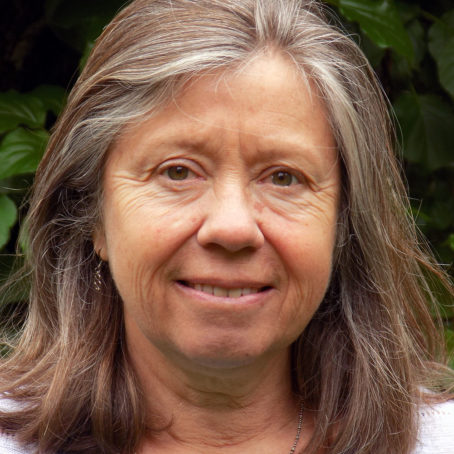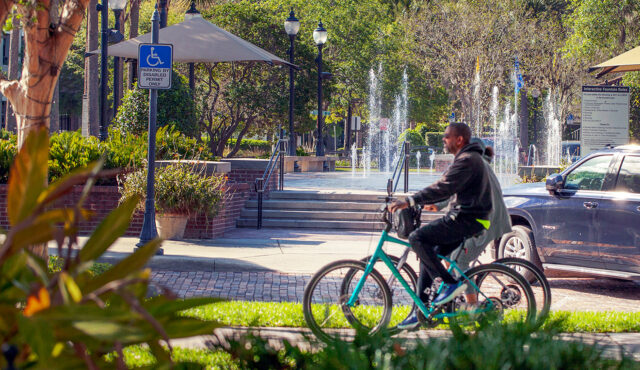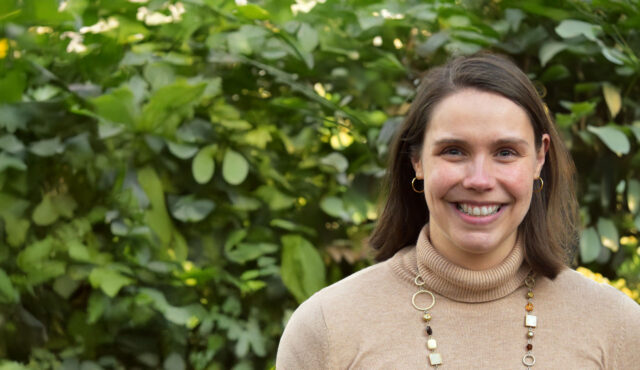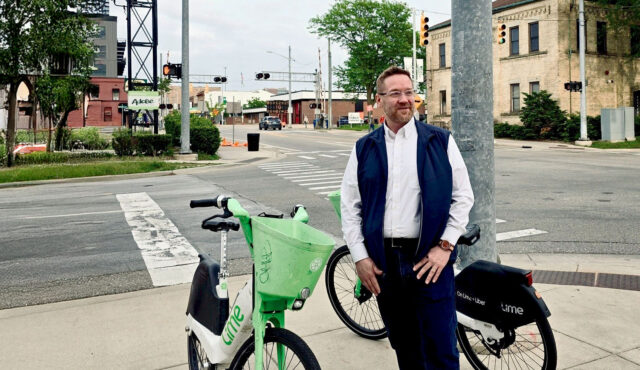Friends, it’s time for meaningful changes. The recently released Sixth Assessment Report of the Intergovernmental Panel on Climate Change (IPCC) provides a stark and sobering assessment of the state of global warming and the actions needed to limit the rise of global temperatures to within a livable range. The transportation sector contributes significantly to greenhouse gas emissions; in many U.S. states it is the single largest contributor. Yet the transportation sector, despite some emerging and well-intended initiatives, by and large is still failing to address this looming catastrophe.
We have observed dissonance between the local goals shared by many communities to reduce transportation-related greenhouse gas emissions, and the state policies that require planners and designers to assume that vehicular traffic will always increase and must be accommodated. Ample evidence shows that the “predict and provide” approach does not end congestion, but rather generates even more traffic. Why do we assume that future vehicular traffic growth is inevitable, and continue to build roads that are wide enough to accommodate motor vehicle volumes anticipated 20 years in the future?
The way the transportation sector responds to the crisis in front of us will dictate not only if we can survive, but who will survive. We need to recognize our industry’s complicity in the harm inflicted upon Black and brown communities through a legacy of systemic racism via policies such as redlining, urban renewal, and highway building. These policies are still with us today in the form of unjust lending practices, transit deserts, and chronic disinvestment. We are faced with the challenge—and the obligation—to act equitably and empathetically to right historical injustices while addressing the needs of the future. It’s time to reverse engineer the transportation sector to derive outcomes that promote our collective survival as a species, not just the survival of the privileged.
Our call to action at CNU30
At CNU30.Oklahoma City, the Congress for New Urbanism’s annual gathering, Toole Design’s Jason DeGray and I organized, moderated, and presented at a session dedicated to the urgency of transportation policy reform that could lead us away from continued reliance on fossil fuels. The session featured transportation reformers Norman Garrick, Lynn Peterson, Chuck Marohn, and Mike Lydon and was a call to action at all levels to address the related challenges of equity, safety, and the climate crisis.
It is time to take our foot off the gas. Read on for key points from our session.
If we can induce vehicular traffic by building roads and parking lots, then we can induce walking, biking, and transit by design as well.
Norman Garrick on induced demand
We can solve this. Professor Norman Garrick of the University of Connecticut made the case that, if we can induce vehicular traffic by building roads and parking lots, then we can induce walking, biking, and transit by design as well. In the words of Jane Jacobs, conventional traffic engineering is an “anti-science masquerading as the science it has betrayed” and ignores the fact that people adapt to the transportation network that is provided. If we provide vehicle capacity to make driving cheap and easy, people will drive. If we provide safe, comfortable, and convenient ways to walk, bike, or take transit, people will use those modes.
Lynn Peterson on big projects
We measure what we care about. Lynn Peterson, the Council President at Portland Metro, shared how her region is looking at how bigger levers, such as congestion pricing, can be engaged to address both climate change and equity by thoroughly evaluating the effects of projects and policies. There is a lot of opportunity to rethink streets and corridors, but we also need to think regionally to plan functional systems. While small actions can do a lot, we need big projects to address big issues such as the environment.
Chuck Marohn on gross negligence
We need to be accountable. Chuck Marohn, President of Strong Towns, explained how the transportation industry has put people in peril by design. Calling it gross negligence, he described how vehicle-focused traffic engineering standards have imperiled people’s personal safety, which is at best ignored and at worst violated for people walking or biking. He also applied this lens of gross negligence to our planetary safety. Projects that increase vehicular capacity will do harm for decades by allowing increases in emissions.
Jason DeGray on valuing ethics, equity, and empathy
We must be mission-driven. Jason DeGray, Toole Design’s Boston Office Director, expressed how transportation decisions must be based on values of equity, ethics, and empathy. Ethics require us to acknowledge our industry’s contributions to climate change and to orient our work toward a meaningful reduction in greenhouse gas emissions. Equity necessitates that we understand the transportation sector’s harmful impact on so many communities, particularly communities of color—and that we ensure the burden of retooling our sector is equitably distributed, not shouldered by those same communities. Empathy involves respecting the lived experience of people, many of whom have no choice but to live within the land-use/transportation systems that have been imposed upon them.
Mike Lydon on acting urgently
We can do things quickly. Mike Lydon of Street Plans showed that beautiful and productive changes to a street can be done quickly and attractively, and do not need to wait for a lumbering federally-funded project. He profiled a quick-build installation in Culver City that resulted in higher rates of transit use and biking, at a fraction of the cost of a permanent capital project. There is potential for much more rapid change in how our streets serve people by taking advantage of tactical urbanism.
Let’s do this.
The work to reform the transportation sector has never been more important and urgent than today. Our planet is at risk because of policies that assume—and then induce—perpetual traffic increases without considering the impacts on human beings now and in the future. We need to engineer sustainable solutions with a fervent effort that matches the intensity of the threat we are facing. We hope to see the entire transportation industry step up to the challenges laid down by these thought leaders.



